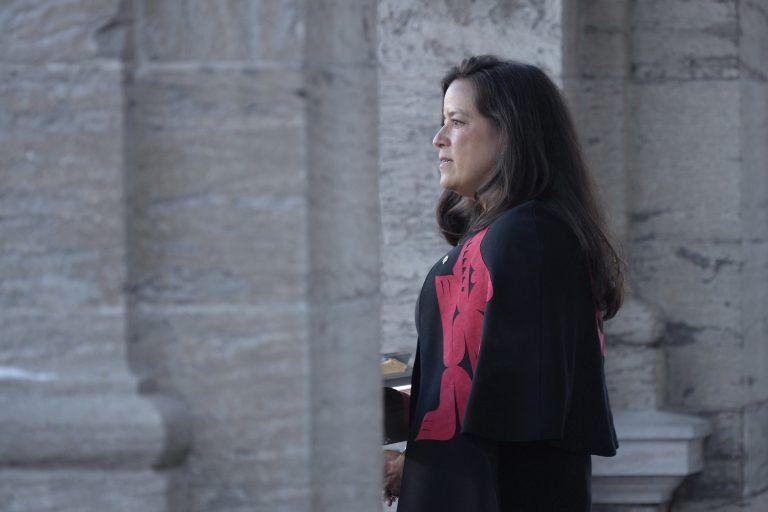Should Wilson-Raybould have resigned on principle if SNC allegations are true?
Politics Insider for February 11: Kneeing the PMO where it counts, why isn’t Wilson-Raybould talking and Pallister relates to Winnipeg’s chill from afar

Veterans Affairs Minister Jodie Wilson-Raybould addresses the media following a swearing in ceremony at Rideau Hall in Ottawa on Monday, Jan. 14, 2019. THE CANADIAN PRESS/Adrian Wyld
Share
Welcome to a sneak peek of the Maclean’s Politics Insider newsletter. Sign-up at the bottom of the page to get it delivered straight to your inbox.
Given Jody Wilson-Raybould‘s prominence in the Trudeau government’s “Sunny Ways” imagery of gender equality, reconciliation, climate change, governance and transparency, the allegation that she rebuffed pressure from the PMO to go easy on SNC-Lavalin in its fraud and corruption case, and her sudden shuffled out of the Justice portfolio, will leave a bruise no matter how this ends, writes Anne Kingston:
There may or may not be a commission of inquiry into the grave allegation that PMO officials put heavy pressure on Jody Wilson-Raybould when she was Justice Minister and Attorney General to help Quebec-based SNC-Lavalin secure deferred prosecution; then, when she refused, she was demoted to Veterans Affairs. We don’t know. There may or may not be a shoe store of shoes yet to drop. We don’t know. Questions swirl in the vacuum of silence and absence of anything approaching clarity, their answers unknown. What we do know is this: the allegation involving Jody Wilson-Raybould and its aftermath has effectively kneed the Liberal government where it hurts the most—squarely in its Real Change™ optics. (Maclean’s)
For two years a remediation agreement was at the heart of SNC-Lavalin’s makeover plan, writes Paul Wells. And anyone who read a Montreal newspaper knew it. The problem was the Public Prosecutions Service of Canada needed the approval of the Attorney General of Canada to proceed. In October, then-AG Wilson-Raybould didn’t give her approval. (Maclean’s)
Should Wilson-Raybould have resigned on principle? If the allegations are true that the PMO pressured her to interfere in the SNC-Lavalin case then yes, she should have, the University of British Columbia law professor Andrew Flavelle tells John Geddes in this Q&A:
A: If these allegations are true—and I have no idea if they are or not—there’s a very good argument the attorney general and minister of justice should have resigned when they happened. There’s some disagreement in the literature about when the attorney general should resign. The one thing pretty much everyone agrees on is the Prime Minister and cabinet can’t interfere in decision-making in a criminal case.
Q: Why should she resign if somebody else acted improperly? Shouldn’t they resign?
A: That’s a separate question, whether they should or not. When there’s been such interference in the attorney general’s criminal responsibilities, there’s a strong convention that he or she should resign, in the same way sometimes people talk about how the Bank of Canada governor, if he was directed to do something by the Prime Minister, would have to resign. It’s not that he’s done something wrong, it’s that the attack on the office is so egregious. (Maclean’s)
More commentary from the weekend about the SNC-Lavalin affair:
- Andrew Coyne: Hard to overstate seriousness of SNC-Lavalin allegations (National Post)
- Susan Delacourt: Can Jody Wilson-Raybould continue to serve in Trudeau’s cabinet? (Toronto Star)
- Tom Brodbeck: PM interference in prosecution is grounds for resignation (Sun)
The sheer wealth of Scheer’s wealth: The Conservative leader loves to tell stories about his frugal upbringing as a contrast to Justin Trudeau’s “vast fortune”, writes Geddes, but the two have a lot more in common than it seems. (Maclean’s)
Wish you were here: Brian Pallister shared Winnipeggers’ wintertime pain with posts on Twitter and Instagram about frigid temperatures and snow in the province’s capital. “Do you like the snow?” one message asked, while another advised:”Expect blowing snow and gusting wind this afternoon! #staywarm my fellow Manitobans!” But unlike his most of his fellow Manitobans, Pallister was at his Winter Legislative Building, otherwise known as his vacation home in tropical Costa Rica. Latest weather there? Clear with a high of 19 degrees Celsius. (Canadian Press)
Weekend politics show roundup
Didn’t catch the politics shows this weekend? Here’s what you missed:
- New Brunswick Premier Blaine Higgs says his province stands to be hit hardest by the Trudeau government’s carbon tax, and that will hit Trudeau’s results in the province in the election this fall: “If you look at industries here, you look at the state they’re in environmentally, we’re starting from a whole different point of view. I don’t have five coal plants to close,” he said on CTV’s Question Period. “We don’t need more tax, and that’s the goal.”(CTV News)
- Jody Wilson-Raybould‘s replacement as attorney minister, Justice Minister David Lametti, said the prime minister did not apply any pressure to Wilson-Raybould to help SNC-Lavalin in its fraud and corruption charges, because the prime minister said so: “I can speak for myself that I’ve had certainly no pressure on me. No attempt to direct me on the matter,” Lametti told CBC’s The House. “And the prime minister has been clear that the same is true of (my) predecessor.” Asked how he knows Wilson-Raybould wasn’t pressured, Lametti said he’s “relying on what the prime minister had said.” (CBC News)
- Is the Trudeau government’s Bill C-69 a deliberate attempt to kill the oil sands? Sen. Doug Black, a former Conservative in the Upper Chamber who now sits as an independent, thinks so. “There will be no new development in the oilsands. Many would argue that’s the very intent of the legislation,” he said on Global’s West Block. “I believe there are parts of the government that believe that would be a desirable outcome.”
Got a tip you want to share? You can securely reach us here.